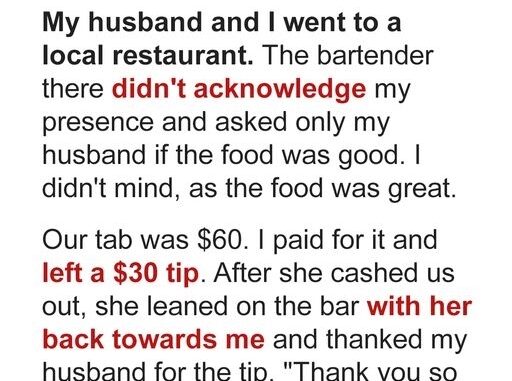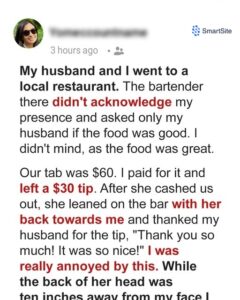
When a woman and her husband went out for a casual dinner one evening, she never anticipated how frustrating the night would become. From the start, the bartender seemed to ignore her, directing all questions about their food and drinks to her husband. The situation only escalated when, after she left a generous tip, the bartender thanked her husband instead of her.
One night, feeling too tired to cook, the woman suggested to her husband that they grab a quick dinner at a local restaurant. Her husband, who was a regular there, agreed. Before they left, the woman mentioned that she had cash on hand and would cover the bill. As they arrived and settled at the bar, her husband noted that the bartender was new and suggested they tip her well, which the woman agreed to do, as she also worked in a tip-based job and understood the importance.

During the meal, the couple ordered food and a few drinks. While the service wasn’t exactly rude, the bartender’s behavior was undeniably odd. She only addressed the husband, asking if his food was alright and if he needed anything else, while seemingly ignoring the woman. Even when it was time to clear the table, the bartender asked the husband if he needed a box for his leftovers, completely overlooking the fact that the woman’s plate was still half-full. While the husband was met with smiles and friendly conversation, the woman received curt, almost disinterested responses.
Despite this, the woman paid the $60 bill and left a $30 tip, determined to follow through with her husband’s request to tip generously. Although the bartender’s attitude felt off, the woman acknowledged that her drinks were always topped off and the food was good.
However, after she handed over the cash, the bartender turned her back on the woman and thanked her husband instead, saying, “Thank you so much for that! It was so nice!” Frustrated, the woman leaned forward and said, “I paid the tab, and I tipped you. You’re welcome,” with a clear tone of sarcasm. Despite being so close, the bartender didn’t acknowledge her and walked away without so much as a glance.
As they left the restaurant, the woman’s husband told her that her comment had embarrassed him and was unnecessary. He frequented the place and didn’t think the bartender had done anything wrong. From his perspective, they’d had great service and never had an empty glass, so he hadn’t noticed any slight toward his wife. He suggested that the bartender may have assumed he paid because he was the man. While technically true, the woman, who worked in customer service herself, insisted that everyone deserves equal treatment, regardless of who is assumed to be paying.
Leave a Reply